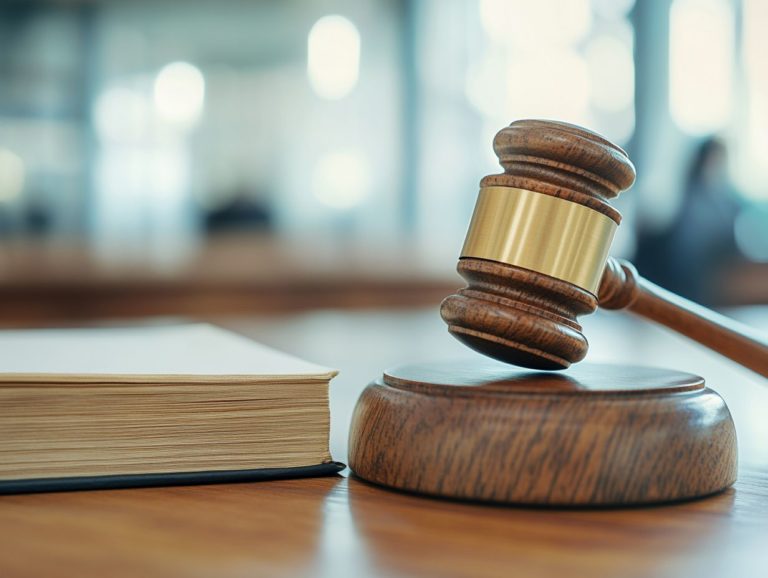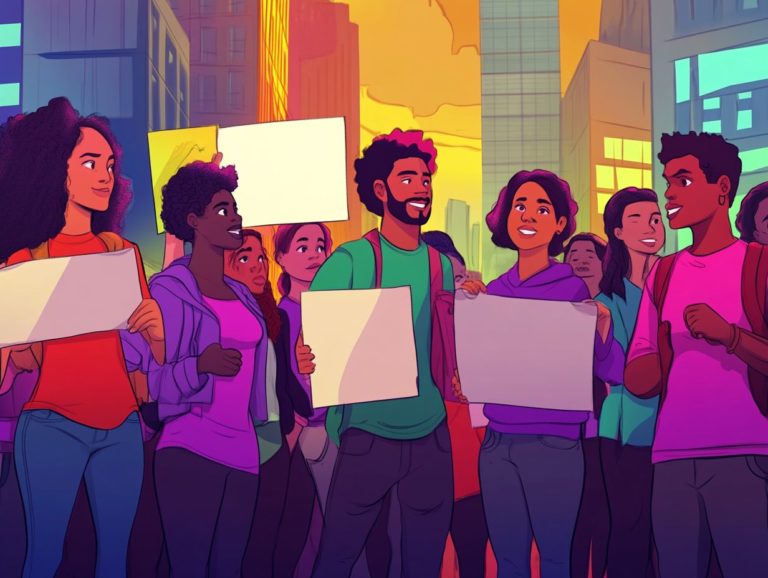Your Rights When Facing Domestic Charges
Facing domestic charges can feel like navigating a labyrinth of confusion. However, grasping your rights and the legal landscape is essential for making sense of this challenging ordeal.
This article outlines the various types of domestic charges you might encounter. It details your legal rights and protections and provides guidance on how to respond if you’re ever falsely accused.
It also emphasizes the importance of gathering evidence, managing restraining orders, and the advantages of enlisting the help of a specialized domestic violence lawyer.
Knowledge is power! Equip yourself to take charge of your situation.
Contents
- Key Takeaways:
- Understanding Domestic Charges
- Your Rights in a Domestic Violence Case
- Steps to Take if Falsely Accused
- Protecting Yourself During the Legal Process
- Seeking Legal Representation
- Frequently Asked Questions
- What are my rights when facing domestic charges?
- Can I be arrested without evidence?
- Do I have the right to know the charges against me?
- What should I do if I believe my rights have been violated during my arrest?
- Do I have the right to refuse a search of my home or belongings?
- What are my rights when facing a protective order or restraining order?
Key Takeaways:

Understand the types of domestic charges to better protect yourself in case of an accusation.
Know your legal rights and protections when facing domestic violence charges, including your rights in hate crime charges, to ensure a fair legal process.
If falsely accused, gather evidence and seek legal representation to build a strong defense and protect yourself during court proceedings.
Understanding Domestic Charges
Understanding domestic charges is crucial for anyone involved in domestic violence cases. In Virginia, laws like the Virginia Code define offenses such as assault and battery, along with their consequences.
These charges can profoundly affect legal rights and the dynamics within families, potentially leading to protective orders, misdemeanor convictions, or even jail time. The intricacies of domestic abuse laws differ from state to state, and being well-informed enables both victims and the accused to maneuver through the complexities of the legal process effectively.
Types of Domestic Charges
Types of domestic charges can vary significantly, covering offenses such as domestic violence, assault, and battery. Each is clearly defined under the Virginia Code and is accompanied by specific legal consequences, including misdemeanor convictions and potential protective orders against the accused.
These offenses often intertwine with more subtle forms of emotional abuse, which can inflict profound psychological harm on victims. Emotional abuse might manifest through threats, manipulation, or controlling behavior. Recognizing these signs is crucial in domestic situations.
Legal responses to such charges can differ markedly. Cases involving physical violence may prompt immediate criminal actions and protective orders, while emotional abuse often demands a more intricate judicial process.
Depending on the severity and nature of the charges, penalties can range from fines to imprisonment. Victims may urgently require protective measures to ensure their safety and prevent contact with the aggressor.
Your Rights in a Domestic Violence Case
In a domestic violence case, it s essential for you to fully understand your rights. As a victim, you possess specific legal protections designed to shield you from further harm while enabling you to pursue justice.
This includes mechanisms like protective orders, which are critical as you navigate the complexities of the legal process. A protective order is a legal document that helps keep you safe by preventing the abuser from contacting you.
You can also explore civil penalties against the aggressor, ensuring that your voice is heard and your safety is prioritized.
Legal Rights and Protections
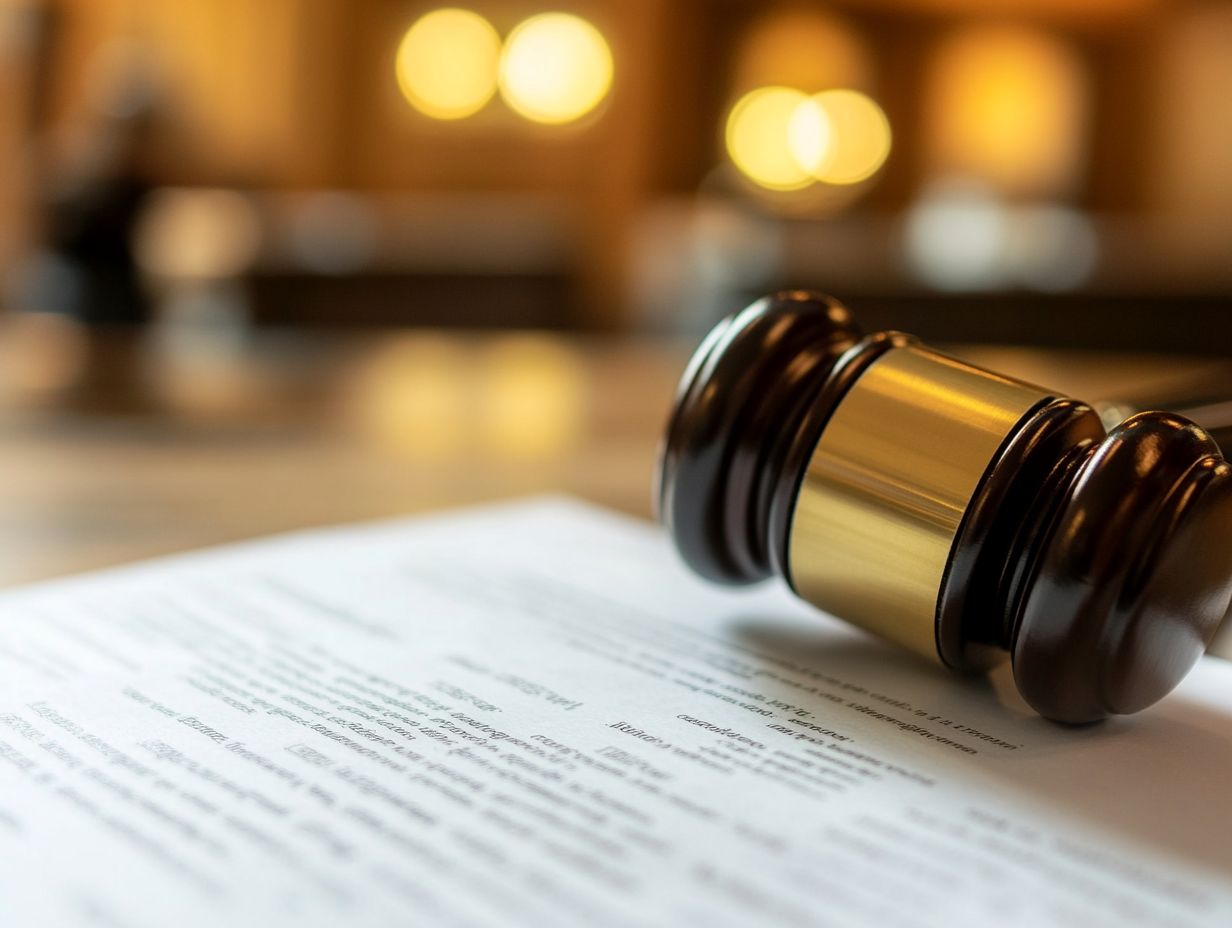
You have legal rights and protections as a victim of domestic violence, including the right to a protective order. This order is a crucial tool designed to enhance your safety and prevent further abuse, while also granting you access to attorney representation to help you navigate the legal landscape effectively.
These protective orders are issued by the court and can explicitly prohibit your abuser from contacting you or approaching your home, adding an essential layer of security to your situation.
Seeking justice can often feel like an uphill battle, but having experienced legal counsel by your side is invaluable. Attorneys can help you understand your rights, file the necessary paperwork, and represent you in court, advocating on your behalf.
They play a vital role in ensuring that the legal proceedings comply with regulations, ultimately enabling you to pursue safety and justice and bringing you closer to the closure you deserve.
Steps to Take if Falsely Accused
If you ever find yourself unjustly accused of domestic violence, it s essential to act swiftly and strategically to safeguard your legal rights.
Begin by gathering evidence and securing witness statements. Carefully review police reports to construct a strong defense against the charges.
Gathering Evidence and Building a Defense
Gathering evidence and building a defense against false accusations is crucial. Document events, collect witness statements, and obtain police reports to support your case.
You may need to include various types of evidence, such as:
- Photographs that illustrate the absence of injuries or damage
- Text messages that provide context or highlight misunderstandings
- Eyewitness accounts that can corroborate the circumstances surrounding the incident
Presenting this evidence in court requires careful organization and strategic storytelling to ensure clarity and impact, strengthening your defense.
Skilled legal representation is essential throughout this complex process. Experienced attorneys can navigate legal landscapes and advocate passionately on your behalf, enhancing your chances of a favorable outcome.
Protecting Yourself During the Legal Process
Protecting yourself during the legal process in domestic violence cases is crucial, especially if a restraining order has been issued against you or if you live with the alleged victim.
You must understand your legal obligations and safety concerns thoroughly. This awareness helps you avoid violating court orders and prevents further complications.
Dealing with Restraining Orders and Court Proceedings
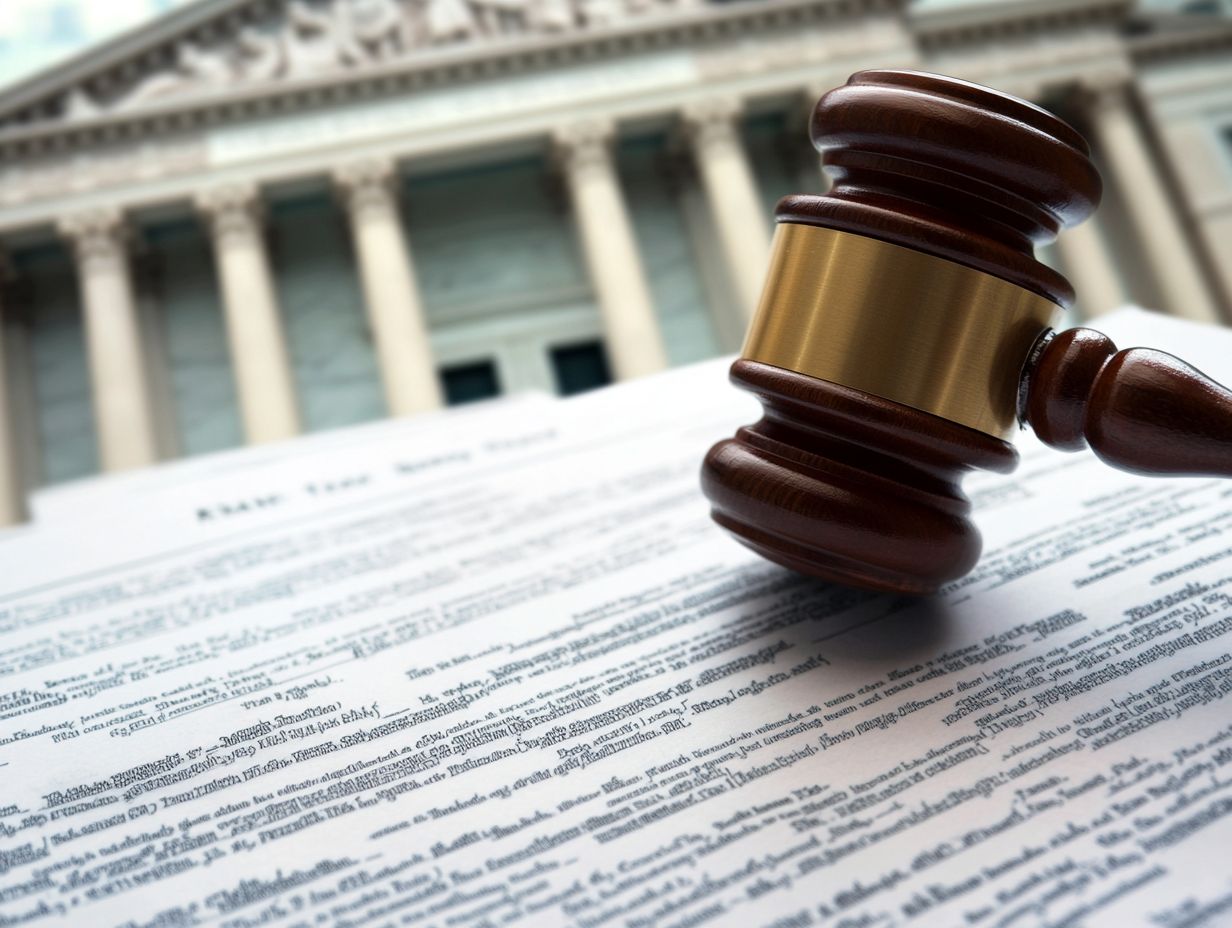
Dealing with restraining orders and court proceedings can feel overwhelming, especially in a domestic violence case. Understanding protective orders, the legal process, and the importance of having a qualified attorney by your side is crucial.
As a respondent, recognize that a restraining order can significantly impact your personal and professional life. It often imposes contact restrictions and may affect your living arrangements. Carefully review the terms and conditions outlined in the order and assess any potential legal implications.
If you believe the order is unjust, consider contesting it by filing a motion for modification or dismissal with the court. Engaging an experienced attorney is vital; they can guide you through procedures, help gather necessary evidence, and present a compelling argument to safeguard your rights.
Seeking Legal Representation
Seeking legal representation in domestic violence cases is crucial for navigating the intricate landscape of the law.
Whether you find yourself as a victim in need of protection or as an accused individual requiring a strong defense, an experienced domestic violence lawyer can provide invaluable legal advice and support every step of the way.
Benefits of Hiring a Domestic Violence Lawyer
Hiring a domestic violence lawyer offers numerous benefits, including expert representation that helps you understand your rights and navigate protective orders with confidence.
Having a dedicated advocate by your side can lighten the emotional burden often tied to such distressing circumstances. A skilled lawyer grasps the intricacies of the legal system and provides essential support in gathering pertinent evidence and preparing necessary documentation.
Court appearances can feel daunting. With an attorney present, you gain security and assurance, allowing you to focus on your healing journey.
Ultimately, the comprehensive assistance a legal representative provides helps you regain control over your life while fiercely safeguarding your rights.
Frequently Asked Questions
Here are some common questions about domestic violence cases.
What are my rights when facing domestic charges?
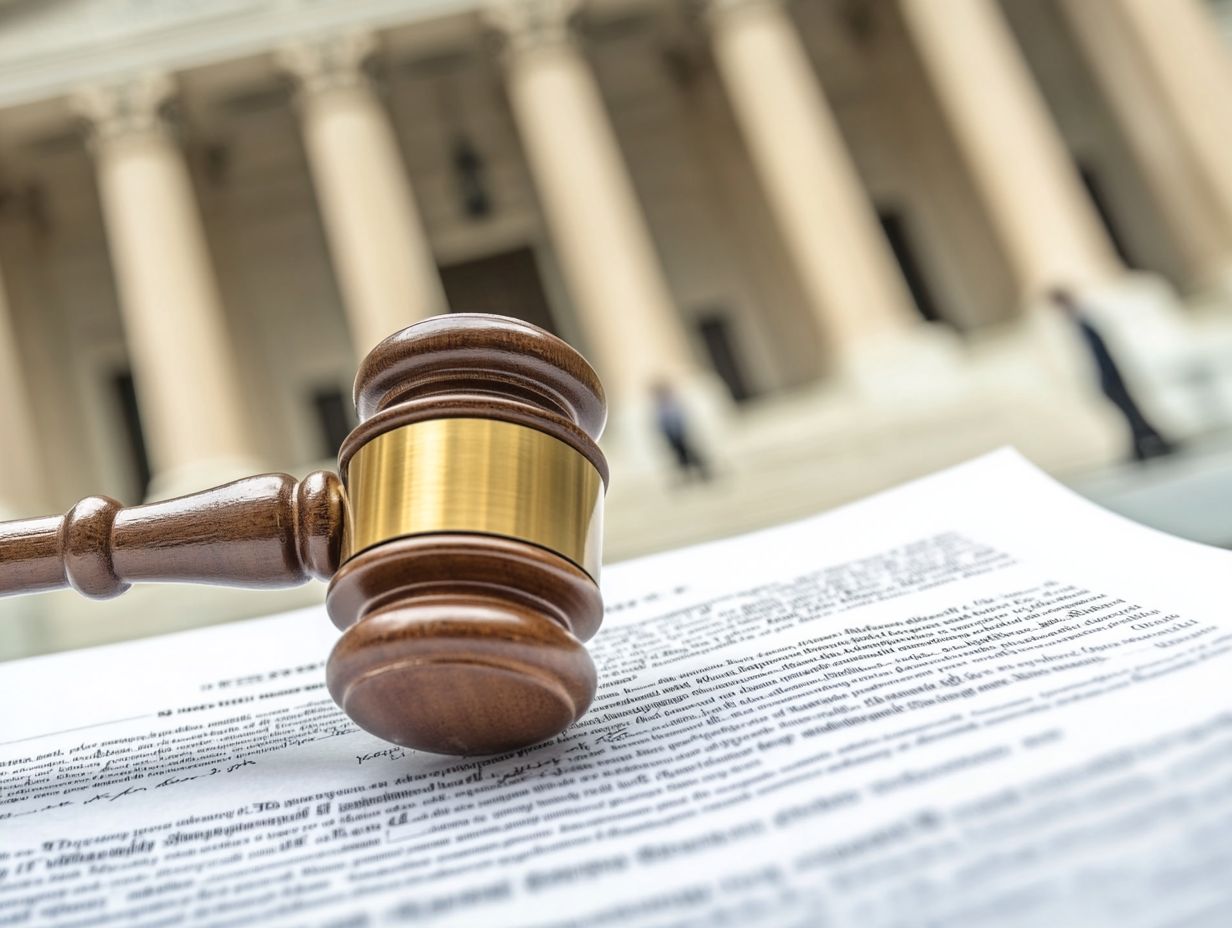
You can choose not to speak. You have the right to an attorney, a fair trial, and to be presumed innocent until proven guilty.
Can I be arrested without evidence?
No, police need a good reason or a warrant to arrest you.
Do I have the right to know the charges against me?
Yes, you have the right to know the specific charges against you. These charges should be clearly stated in the arrest warrant or during your initial court appearance.
What should I do if I believe my rights have been violated during my arrest?
Contact a criminal defense attorney right away if you believe your rights were violated. They can help you file a complaint and take legal action if necessary.
Do I have the right to refuse a search of my home or belongings?
Yes, you can refuse a search of your home or belongings unless police have a valid search warrant or your consent.
What are my rights when facing a protective order or restraining order?
If you have been served with a protective or restraining order, you have the right to a hearing to contest it. You also have the right to have an attorney represent you during the hearing.

